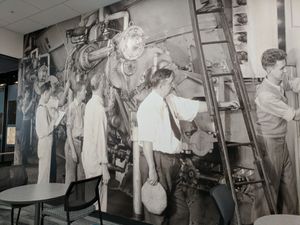The last year has really made it clear that library systems sit in a broader network environment. The emerging integration challenge is integration with the systems environment of the user. This makes it more important to think about the broader network systems environment. As I look at that broader environment, I see four emphases.
1. Public platforms. The emergence of several massive data and computational network presences, which have become infrastructural platforms for a range of users and uses. Google, Amazon and eBay have each become central to the behaviors of millions of users, have each moved beyond their founding service, have each opened up their services and data to other applications, have each developed revenue sharing models with partners. Their ‘users’ are still people, but they are also building out to an environment where a growing number of their ‘users’ are programs, other applications which talk to their machine interfaces. The most recent example of this is Google’s announcement of its API for ad management. They are tied into the fabric of user behaviors and applications through an intrastuctural tissue of lightweight, loosely coupled, webby approaches. They make data work hard: they extract as much intelligence as possible from growing reservoirs of data, and their services adapt reflexively based on accumulated data about users. They are massive gravitational hubs for consumers.
2. Personal and interpersonal spaces are major focuses. People accumulate learning caches, and work caches, and opinion caches (blogs?), and photo caches, and … life caches. The emerging ecology and economy of image and music management, where materials may be distributed and moved across personal, shared and commercial spaces indicate a direction. Blogs, wikis, RSS, podcasting: a range of lightweight applications is rapidly emerging to help manage and share personal content. Again, we have seen the emergence of major consolidation services — Flickr, bloglines, and blogger, for example — which are intrastucturally connected with each other and user environments through RSS. These resources may be moved across cellphones, hard drives, portable devices, as content flows between the various caches that comprise our personal and, for some, increasingly collective data spaces. Increasingly it is the *-flow which is the consumer of services, where the *-flow is supported by a systems environment: the workflow, the learnflow, the researchflow, the consumer flow, the musicflow, …
3. Service orientation and on-demand platforms. Two related things here. First, service oriented architectures have been widely promoted and discussed. Whatever about actual implementation, the advantages of moving from large monolithic business systems to systems composed from more fine-grained service chunks seems to be accepted. This approach is in line with service goals which emphasise rapidly changing consumer needs, and design goals which need to respond to this need flexibly and economically. Second, there is growing interest in software delivered as a service over the network, in the ability to buy ‘on demand’ rather than build business functionality locally. These two are related in the sense that each seeks to reduce the cost and complexity of system ownership, and to support more flexible management of changing system needs in recombinant service environments. That said, we are in early days.
4. The web all the way. There is a strong argument that simpler, web-based approaches are to be preferred to more heavyweight protocols and data formats. This is particularly the case for what I call intrastructure, the tissue that connects applications together and weaves them into user behavior.
It is interesting to think about what library systems development looks like in the light of these emphases. I will return to this in future posts.
Share
More from LorcanDempsey.net



